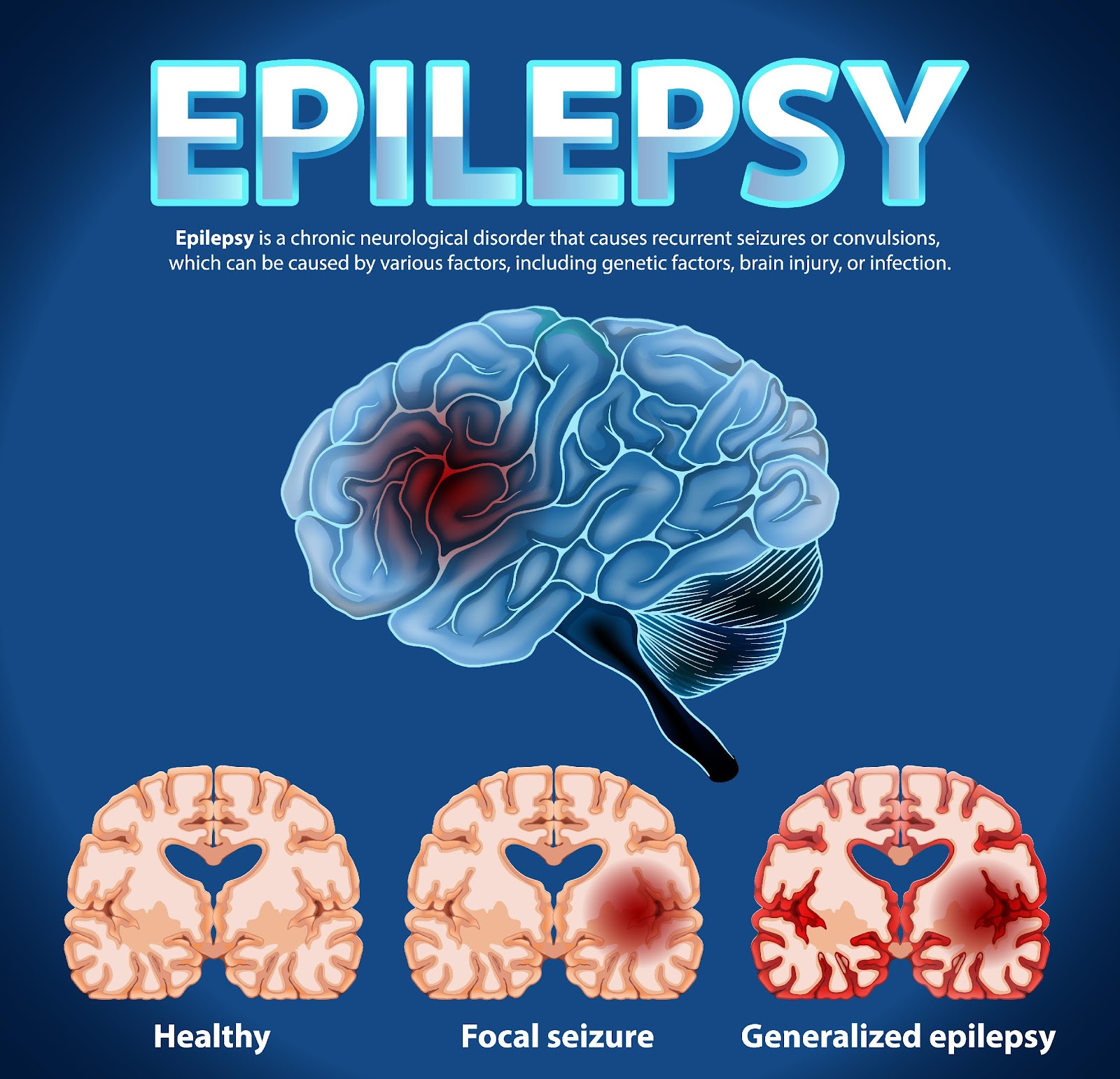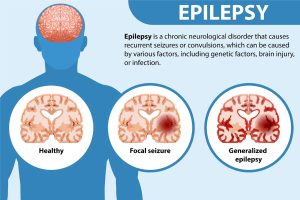Disclaimer:
This article is for information purposes only. It is not a substitute for medical advice or treatment. Seek medical care for your treatment.
Epilepsy:
Epilepsy is a brain disorder that happens when some nerve cells of your brain go wrong. They can influence your behavior or the way you see things around you for a short time. Epilepsy can cause changes to your awareness, muscle control, sensations and emotions. Epilepsy is the most frequent cause of seizures. Epilepsy is not the only cause of seizures. There can be several other causes of seizures:
- High fever, probably from an infection
- Lack of sleep
- Low blood sodium
- Consuming some medicines
- Bleeding in the brain
- Stroke
- Brain tumor
- Amphetamines
- Alcohol abuse
Epilepsy is divided into four types based on the seizures you are having:
- Focal epilepsy
- Generalized epilepsy
- Generalized and focal epilepsy
- Unknown if generalized or focal epilepsy
- Focal Epilepsy: Their names are taken from the particular area of your brain in which they form. They can make you feel, see, or hear things that aren’t there, as well as have emotional and physical effects. This kind of seizure, sometimes known as a partial seizure, affects about 60% of individuals with epilepsy. The symptoms of a focal seizure can sometimes be confused for signs of a neurological condition or mental illness. There are four types of focal epilepsy seizures:
- Focal aware seizures: means you are awake and aware during the seizure.
- Focal impaired awareness seizures: means you are confused or have no idea what’s happening during your seizure.
- Focal motor seizures: means that you can move to some extent-anything from twitching, to spasms, to rubbing hands, to walking around. Some types that you may hear your doctor discuss about are atonic, clonic, epileptic spasms, myoclonic and tonic.
- Focal non-motor seizures: this seizure does not cause twitches or other movements. It changes the way you feel or ponder. You may have severe emotions, odd feelings or signs like palpitation, goose bumps or hot and cold flashes.
- Generalized epilepsy: happen when nerve cells on both sides of your brain misfire, that leads to muscle spasms, black out or fall. There are six types of generalized seizures:
- Tonic-clonic seizures: these seizures are very evident and they last 1-3 minutes. In this seizure your body stiffens, trembles, jerks, make you bite your tongue and you lose consciousness, sometimes you may lose control over your bladder or bowels.
- Clonic seizures: your muscles have spasms which can make the muscles of your face, neck and arm jerk ceaselessly.
- Tonic seizures: legs, arms or trunk muscle get stressed up. These generally happen when you are asleep and last for less than 20 seconds. You may lose balance and injure yourself if you are standing at the time of seizure. These are more frequent in people who have Lennox-Gastaut syndrome.
- Atonic seizures: your head may tilt forward as your muscles abruptly go hobble. You may drop something if you’re holding it. These generally last less than 15 seconds although some people have multiple in a row. People who frequently get atonic seizures may need to wear helmet to safeguard their heads. People with Lennox-Gastaut syndrome and Dravet syndrome are more likely to get this kind of a seizure.
- Myoclonic seizures: your muscles suddenly shiver as if you have been shocked. They may begin in the same part of the brain as an atonic seizure and some people have both myoclonic and atonic seizures.
- Absence seizures: you seem to be detached from the people around you and you do not respond to them. During the seizure you may stare blankly and roll your eyes back in your head. They last only for few seconds and do not remember them. These seizures are recurrent in children under 14.
- Generalized and Focal epilepsy: this is the type of epilepsy where people have both generalized and focal seizures.
- Unknown if generalized or Focal Epilepsy: sometimes doctors are certain that a person has epilepsy but they do not know whether the seizures are focal or generalized. This generally happens when you are alone and no one is there to witness that what happened. Your doctor also consider your epilepsy as “unknown if generalized or focal epilepsy” in case your results are not clear.
What triggers an epileptic seizure?
Seizures can be triggered by the things in the environment. Seizure triggers don’t develop epilepsy but may aggravate seizures in people with epilepsy. The majority of epileptics lack consistent triggers that reliably set off a seizure. Still, they are frequently able to pinpoint the conditions that facilitate a seizure. Possible causes of seizures are:
- Alcohol
- Flashing lights
- Illegal drug use
- Skipping or over dosage of prescribed anti-seizure medicines
- Lack of sleep
- Hormone changes during menstrual cycle
- Stress
- Dehydration
- Skipped meals
- Illness
- Head injury
- Very low blood sugar
Conclusion:
There are different types of epilepsy and they have different symptoms. Determining triggers is not simple. A single incident does not indicate that something is a trigger. Mostly multiple factors trigger a seizure. Best is to keep a seizure journal. Keep a note of following things after every seizure:
- Time and date
- Activity you were doing
- Things happening around you
- Odd sights, smells or sounds
- Surprising stressors
- What you eat and after how long you eat
- Fatigue level


